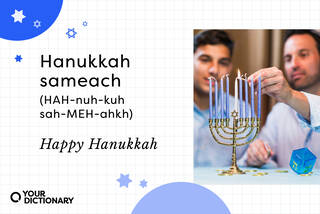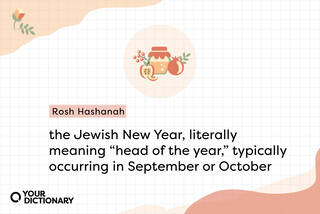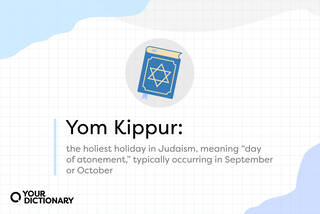
Passover is a Jewish holiday that observes the Israelites’ historic exodus from slavery in Egypt. It marks the night that the angel of death “passed over” Jewish homes, thus sparing them from the last of ten plagues (the death of every firstborn son).
Today, around the world, people of the Jewish faith celebrate Passover with friends and family to commemorate the liberation of their people from Egypt. Even if you don’t observe Passover yourself, there are many ways you can greet your Jewish friends and celebrants during the Passover season.
When Is Passover?
Passover begins in the spring season, and it lasts for seven or eight days.
It starts on the 15th day of the Hebrew month Nisan and ends on the 22nd day. Because the Hebrew calendar is based on the lunar cycle, it’s about 10 or 11 days shorter than the Western Gregorian calendar, so it falls on different Gregorian dates every year.
In the upcoming years, Passover will fall on:
- 2023: April 5–12
- 2024: April 22–29
- 2025: April 12–20
- 2026: April 1–9
Quick Tip
Like all holidays, Passover should be capitalized when you use it in a sentence.
- Do you celebrate Passover?
- Happy Passover to you!
Passover Greetings in English
Passover greetings in English can be heartfelt and sincere. You can use them even if you aren’t Jewish yourself.
- Happy Passover!
- Happy Holiday!
- Happy Pesach (peh-SAKH) to you and your family.
- Have a sweet Passover.
- Love to you this Passover.
- May your Seder be meaningful and fulfilling.
- May you and your family have a joyous Passover.
- Sweet Passover to you and yours!
- Wishing you and your loved ones a blessed Passover.
- Wishing you a joyous Passover!

How To Say “Happy Hanukkah”: Appropriate Greetings & Wishes
Passover Greetings in Hebrew and Yiddish
If you want to wish your Jewish loved ones a traditional passover greeting for a blessed or joyous Passover (or Pesach), try one of these options in Hebrew or Yiddish.
Need to Know
When pronouncing words in Hebrew, the /ch/ (Hebrew letter chet) doesn’t make the same /ch/ sound as in the English charge or chin. It sounds more like a /kh/ sound, similar to Chanukah or Bach).
Chag Pesach Sameach
The Hebrew greeting Chag Pesach Sameach (pronounced KHAG peh-SAKH sah-MAY-akh) means “Happy Passover Holiday!” Chag means “holiday,” Pesach means “Passover,” and Sameach means “happy” or “joyful.”
Chag Sameach
For a more basic Passover greeting, try Chag Sameach (KHAG sah-MAY-akh). It means “Happy holidays” or “Happy festival” — and you can use it for other Jewish holidays as well.

Greeting a Friend on Rosh Hashanah Appropriately
Pesach Sameach
A simplified Hebrew Passover greeting is Pesach Sameach (PEH-sakh sah-MAY-akh), which means “Happy Passover!”
Chag Kasher V’sameach
When you add kasher to the greeting, you get Chag Kasher V’sameach (KHAG kah-SHER vuh-sah-MAY-akh), which means “A happy and kosher holiday.”
Chag Pesach Kasher Vesame’ach
To get more specific, you can say Chag Pesach Kasher Vesame’ach (KHAG peh-SAKH kah-SHER vuh-sah-MAY-akh). It means “A kosher and joyous Passover.”
Zissen Pesach
Zissen Pesach (zih-SEN peh-SAKH) is a greeting that combines Hebrew and Yiddish. It means “Sweet Passover” and is a nice alternative Passover greeting for your loved ones. You may also see it spelled a zisn Pesach.

List of English Words of Yiddish Origin
Gut Yom Tov
An Ashkanazi Passover greeting is Gut Yom Tov (gut YOM tov), or Gut Yun Tif (gut YOON tiff) in Yiddish. It translates to “Good day,” and is a standard greeting for most holidays, including Passover.
Gut Mo’ed
Gut Mo’ed ((gut MOY-ed) is a Yiddish Passover greeting that means “Good holiday.” Specifically, it refers to the intermediate days of Passover (chol ha-moed).
A Koshern Un Freilichen Pesach
Another Yiddish greeting, A koshern un freilichen Pesach (Ah KUH-sher-in oon FRAY-lekh-in peh-SAKH) means “Have a happy and kosher Passover.” You may also see it spelled A koshern un freylakhn Pesach.
Gezuntn Zumer
When Passover has finished, you can say Gezuntn Zumer (geh-ZOON-ton ZOOM-er), which means “Healthy summer.”

Yom Kippur: How To Appropriately Greet a Holiday Observer